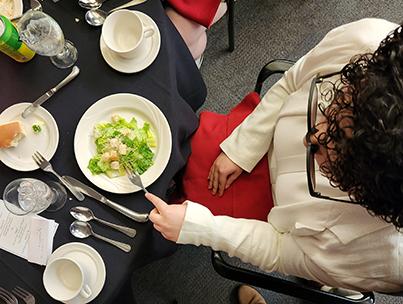Career Development Center’s Etiquette Dinner teaches students the do’s and don’ts of eating while interviewing

One of the first things students learned at the recent Etiquette Dinner, hosted Feb. 8 by the Alfred University Career Development Center in the Powell Campus Center’s Knight Club, was that the primary purpose of a business dinner is not the food.
That’s according to Heather Kolakowski, of a Cornell University’s School of Hotel and Restaurant Management, who guided about 25 Alfred University students through a four-course dinner, offering tips on how to make the most of a business-focused occasion that involves multiple forks, knives, spoons, and sometimes pasta.
Plates of spaghetti can be tricky to navigate, Kolakowski advised, so it’s best to avoid ordering noodles. On the other hand, if they’re unavoidable (and one of the courses at the Knight Club dinner was chicken served with spaghetti), use a fork in one hand and a spoon in the other for twirling. Above all, Kolakowski added, don’t cut the pasta.
Business dinners and lunches are a major element in professionals’ workdays, Alfred University Mark Zupan counseled just before the first course was served. A business meal may be an important part of the interview process, and Zupan provided several examples of how easy it is to undermine an interview through an innocent mistake involving manners. When in an Arab country, for example, Zupan said, it’s advisable not to show the soles of one’s shoes. So don’t cross your legs.
Along with social faux pas, Kolakowski added there are some foods that young professionals should probably steer clear of while trying to impress a future boss. A business dinner, she said, is probably not the best occasion to try snails for the first time. Or alligator. Stick to food that’s easy to cut (but don’t cut the pasta). Cut food into easily manageable pieces. Small pieces of food are easier to chew; that’s important because odds are, as soon as you’ve stuck a piece of chicken in your mouth, some middle manager is going to ask you a question that your future career depends on. When that happens, Kolakowski said, just smile, keep chewing, organize your thoughts, swallow, say, “Excuse me,” and begin talking calmly.
Follow the lead of the host, she said. If the host of the dinner is a slow eater, you may have to dial back your own pace (Remember: it’s not about the food; you’re there to converse).
Four courses were served for last week’s Etiquette dinner: a lightly fried rice ball, a green salad, chicken (with the dreaded pasta), and a dessert. At the end of the evening, the decibel level of conversations around the tables had risen noticeably, and students were paying less attention to the niceties of eating spaghetti as they chatted with their table mates.
“I think it went really well,” said Meghan Dwyer, assistant director of employer relations and event planning for the University’s Career Development Center, and who planned the Etiquette Dinner. The idea behind University Etiquette Dinners, Dwyer said, is to help students feel more comfortable when they’re interviewing at social business events. “It’s an opportunity for our students to enhance their professional business skills.”
More Etiquette Dinners are being planned for the future, Dwyer added, and details of the dinners are being tweaked. One possibility: the inclusion of a cocktail hour during which students learn how to hold a cocktail, or mocktail, while introducing themselves to other people.
“These things don’t always come easily,” Dwyer said. “How exactly do you shake someone’s hand when you’re holding a drink in your own hand? As students learn these basic skills, they just start feeling more comfortable.”
